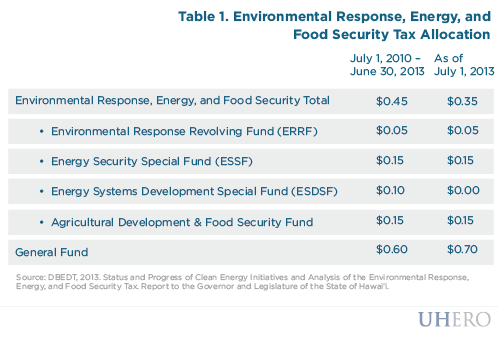By Sherilyn Wee and Makena Coffman
The one-dollar increase in Hawai‘i’s environmental tax from five-cents since its inception in 1993 to $1.05 effective July 1, 2010 was a stepping stone in Hawai‘i’s clean energy progress. While in theory it serves to discourage fossil fuels (internalizing the negative externality), its major impact has been as a funding source for energy and food security initiatives. Act 73 temporarily created three new funds—the Energy Security Special Fund, the Energy Systems Development Special Fund, and the Agricultural Development & Food Security Fund. Providing support for the Hawai‘i Clean Energy Initiative (HCEI) and the Greenhouse Gas Emissions Reduction Task Force (GHGRTF) as well as instrumental research conducted by the Hawai‘i Natural Energy Institute (HNEI) are just several examples of how the barrel tax has contributed to advancing the State’s energy goals.
What does the barrel tax apply to and how much has been collected?
As of the end of fiscal year 2013, the $1.05 per barrel tax on petroleum products—excluding jet fuel (aviation fuel) and any fuel sold to a refiner—totaled $80 million dollars statewide; on an annual basis this translates to approximately $27 million dollars. The petroleum products taxed represents roughly 2/3 of the barrels of oil imported each year.
Ongoing/Current Issues
Originally, of the $1.05 tax, forty-five cents was allocated to supporting environmental response, energy, and food security, while the remaining sixty-cents was apportioned to the general fund. During the 2013 Legislative session, though unsuccessful, it was proposed that the tax be distributed according to its intended purpose, rather than given to the general fund. As such, increasing the amount allocated to environmental response, energy and food security funds, along with re-establishing the energy systems development special fund, and extending the barrel tax to 2030 have been proposed under SB2196 in the current Legislative Session. 1 The barrel tax is set to sunset in 2015, and Hawai‘i’s energy industry hopes to extend the repeal of the barrel tax to 2030, the same year as Hawai‘i’s ultimate renewable portfolio standards (RPS) target.
Table 1 below shows the original breakdown under Act 73, SLH 2010, and the allocation as of July 1, 2013.

BLOG POSTS ARE PRELIMINARY MATERIALS CIRCULATED TO STIMULATE DISCUSSION AND CRITICAL COMMENT. THE VIEWS EXPRESSED ARE THOSE OF THE INDIVIDUAL AUTHORS. WHILE BLOG POSTS BENEFIT FROM ACTIVE UHERO DISCUSSION, THEY HAVE NOT UNDERGONE FORMAL ACADEMIC PEER REVIEW.
[1] The bill text and status can be found here: http://www.capitol.hawaii.gov/measure_indiv.aspx?billtype=SB&billnumber=2196&year=2014